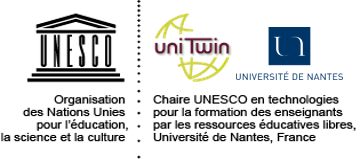The Unesco chair of Open Educational Resources at
University of Nantes, France and the Knowldege for All
Foundation organize on Tuesday
16th October 2018, in Nantes (the LS2N Lab) and
in the context of the European project X5-GON a one day workshop on
New Technologies for Open Education.
The goal of the workshop is to allow discussion and
debate between
- · promoters and
researchers developing new technologies, some of which have
not been applied in education,
- · actors and
decision makers from the different education organizations who
will be able to describe the complex issues they see and
evaluate if the proposed technologies can address these,
- · experimenters who
are already trying new digital and AI inspired technologies in
the field of education.
The workshop will propose talks about blockchains,
hybrid social networks, inclusion, evaluation, curricula
alignment, end-to-end communication, interoperability…
More generally, we aim at drawing a broad picture
of how technologies, and more specifically artificial
intelligence, can -but obviously not on their own !- help solve
some of the issues facing education.
Presentations and panels (in English) will take
place in the Laboratoire
des Sciences du Numérique de Nantes.
All information will be found here: https://www.x5gon.org/event/tech-for-oer/
Registration to the workshop is free but should be
done well in advance: please send an email to cdlh@xxxxxxxxxxxxxx and
you will receive a link.
The program of the workshop will be online shortly
and will be based on talks by the following speakers:
Speakers and
panellists
- Mathias Bouckaert
(OECD, Paris): « Open
educational resources across the OECD, current state of play
and emerging trends ».
- Since the Centre for Educational research and
Innovation at the OECD first published its report on “Giving
Knowledge for Free” in 2007, the degree of development and
use of OER has significantly increased across education
systems as highlighted in the report “Open Educational
resources: a catalyst for innovation” (Orr et al., 2015).
The presentation will place perspective in the debate by
portraying those evolutions and their implications for
policy. It will also feature more recent work conducted at
the OECD around the topic of open higher education and its
potential repercussions on selection, quality and costs
- Thomas Cerqueus (Lengow, France): “Thesaurus
matching: a use case in e-commerce. “
- Lengow is concerned with proposing systems
allowing retailers to efficiently propose their product on a
wide variety of online merchant sites. It may be the case
where the same technologies could help courseware be
deployed over a variety of platforms with much less effort
than today.
- Perrine de Coëtlogon (Blockchain & Education
advisor at Université de Lille, France): “How will blockchain
contribute to the Open Educational World Movement?
- Perrine hosts a
digital working group at national level on Blockchain and
Education (Blockchain4Edu) within the directorate for
pedagogical innovation of the University of Lille (France). Perrine de Coëtlogon
and her colleagues envisage that in an open learning
environment it will be necessary to be able to trace the
different contributions to open educational resources. They
aim to use a Blockchain solution for this.
- Marko Grobelnik
Researcher at JSI, Slovenia.
- Mitja Jermol (Josef Stefan Institute, Slovenia).
-
- Alfons Juan (Universidad Politecnica de Valencia,
Spain): “End-to-end communication tools for OER”
- Alfons is senior researcher at Universidad
Politecnica of Valencia (https://www.mllp.upv.es/ ) and has led his team in various European
projects in which they have developed technologies to
transcribe and translate scientific and educational
videos. They now aim to deliver an end-to end solution,
with the translation being given through voice synthesis
including voice models for the original speaker.
- Benjamin Ninassi (INRIA, France): “Hybrid Social
networks of learners”.
- Benjamin is Research
engineer at INRIA, technical leader of the IT development
team and main developer of the Class'Code Platform (http://classcode.fr ). The
platform aims at helping teachers and educators learn to
teach code through online activities and the promotion of a
social network built from these activities.
- Samuel Paccoud (FUN, France): Title to be
announced
- Samuel is CTO at FUN, the main French speaking
MOOC platform (https://www.fun-mooc.fr/) . His talk will be about the convergence and
interoperability of online learning tools through shared
formats and norms.
- John
Shawe-Taylor, UCL, United Kingdom).
- John is
Professor at University College of London, a trustee of the
Knowledge for All foundation and the holder of the first
Unesco chair in Artificial Intelligence. He leads the X5-GON
Horizon 2020 project whose goal is to build an efficient
ecosystem for Open Educational Resources.
- Jutta Trevinarus,Ontario
College of Art and Design University:
“Smarter
Systems Include the Margins”.
- Jutta is Professor at the Ontario College
of Art and Design University (OCADU) in
Toronto Founder and CEO
of the Inclusive
Design Research Centre At the
Inclusive Design Research Centre proposals are being made to
allow web navigation (and more specifically learning) to be
more inclusive and friendly.
--


